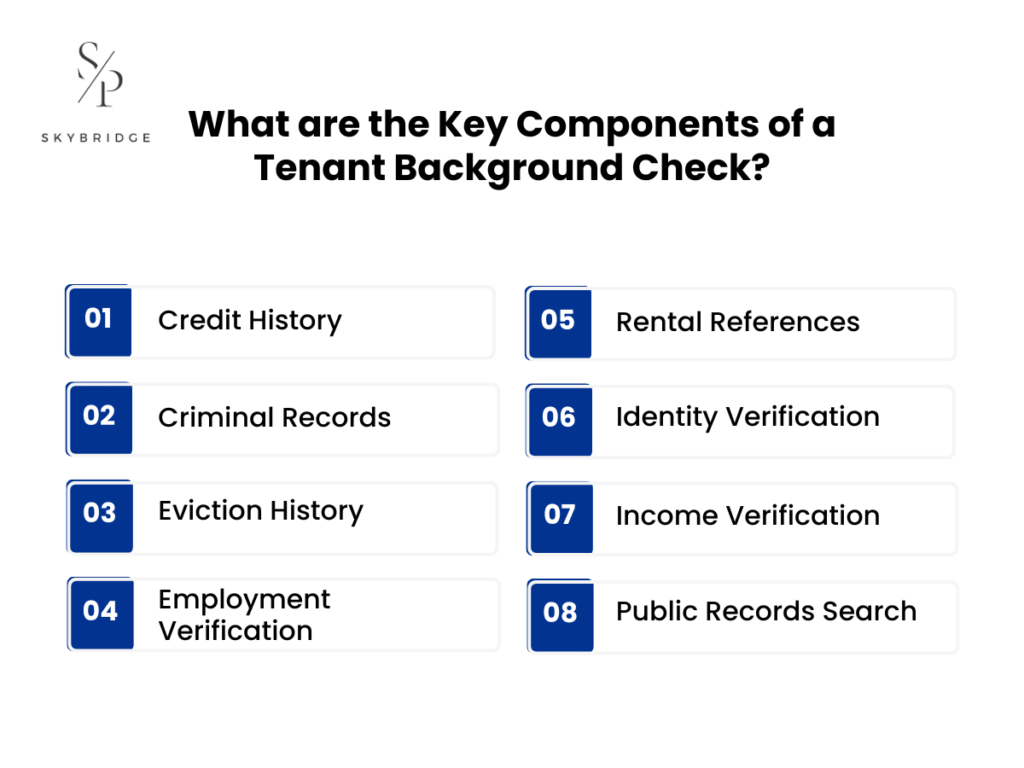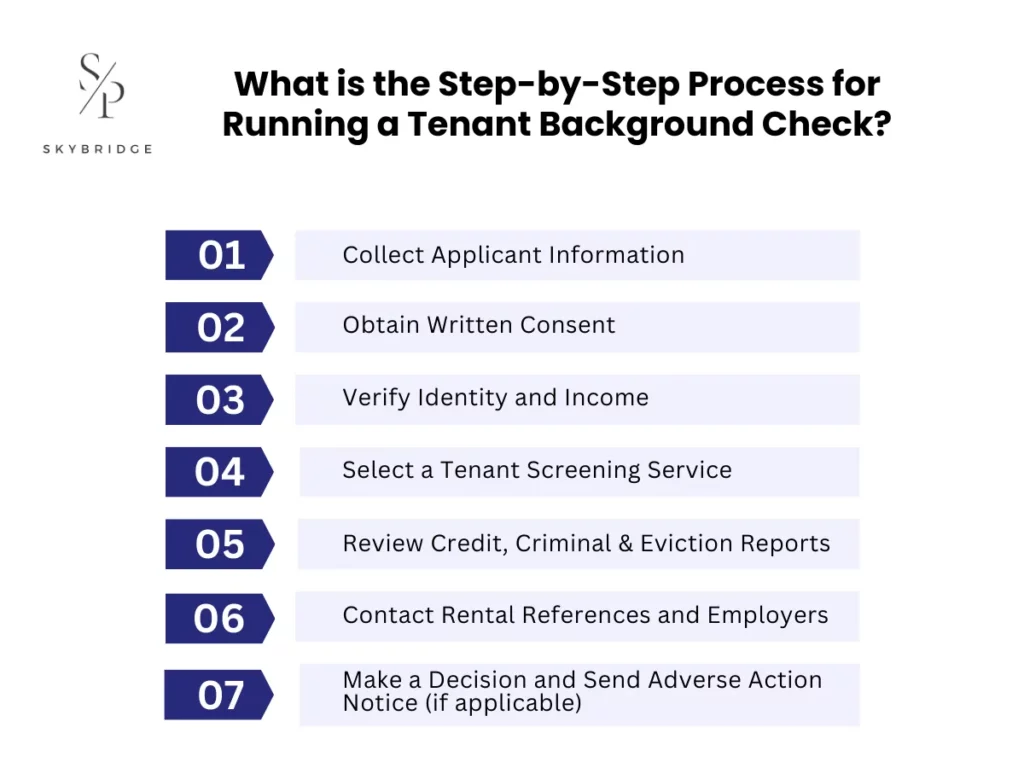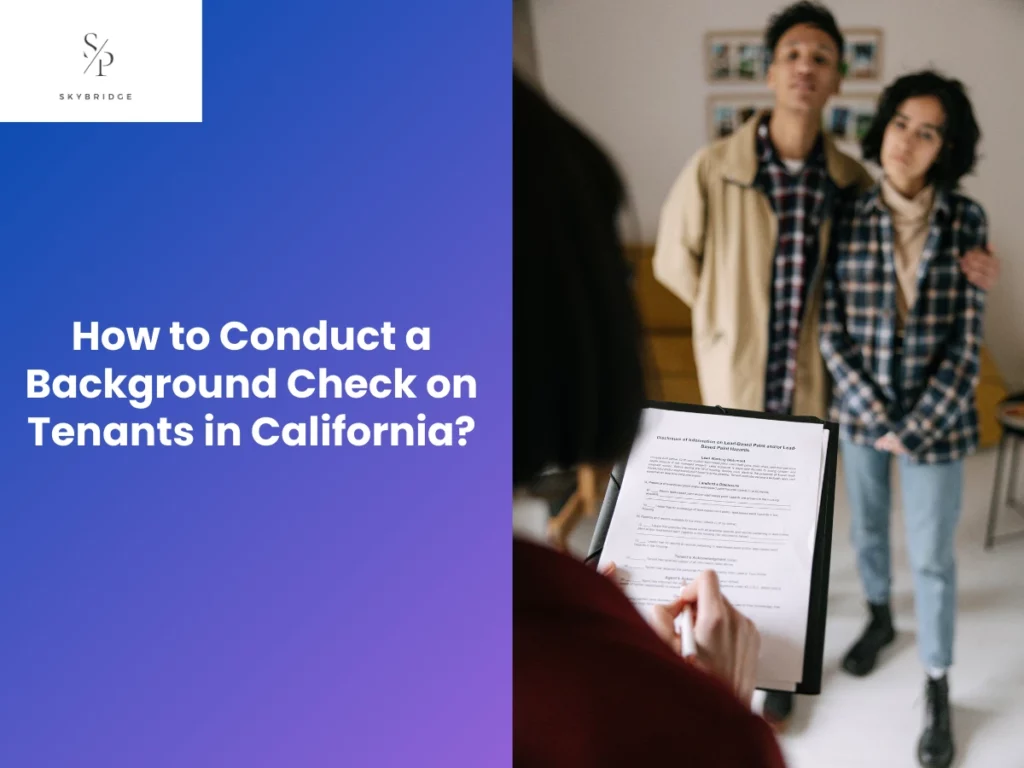If you are leasing a condo in Orange County or managing a duplex in San Bernardino, screening potential tenants is one of the most important steps in the rental process. A background check helps verify who the applicant is, how they have handled past rental obligations, and whether they are financially stable. In California’s regulated rental market, having a lawful screening process in place is key to avoiding long-term issues.
A standard tenant background check typically includes a credit evaluation, income and employment verification, eviction records, identity confirmation, and a review of the individual’s criminal history. These actions must comply with laws such as the Fair Credit Reporting Act (FCRA) and the California Fair Chance Act, which outline when and how sensitive data can be used.
By applying a structured and legally compliant process, landlords improve tenant quality, reduce the risk of payment issues, and protect their rental income. Effective tenant screening enhances leasing decisions while ensuring landlords comply with California law.
What Is a Tenant Background Check?
A tenant background check is a screening tool landlords use to evaluate a rental applicant’s qualifications. These qualifications reflect the applicant’s financial stability, history of honoring lease agreements, and potential risk to the property or neighbors.
The background check process usually takes 24 to 72 hours and includes a review of the applicant’s credit report, criminal records, eviction history, and rental references. It also involves employment verification, income confirmation, and public records checks for bankruptcies, liens, or civil judgments. In California, landlords must obtain written consent before conducting these checks and comply with applicable laws, including the Fair Credit Reporting Act and the Fair Chance Act.
The primary goal of a tenant background check is to help landlords identify qualified, low-risk tenants. When done consistently and legally, tenant background checks improve decision-making and help protect the value and stability of rental properties.
Why Tenant Screening Matters for California Landlords?
Tenant screening protects California landlords from rent defaults, legal disputes, and property damage by ensuring only qualified, low-risk individuals are considered before signing a lease. In a state with strict housing laws and high rental demand, it also plays a critical role in maintaining legal compliance and applying consistent criteria across all applicants. By evaluating each tenant’s credit, rental history, income, and background, landlords gain essential insight into the applicant’s financial reliability and behavior. A thorough process reduces risk, protects property value, and supports long-term tenant stability.
Key reasons highlighting the importance of tenant screening are:
- Avoids high-risk tenants with poor credit, eviction history, or past lease violations
- Supports legal compliance with FCRA, Fair Chance Act, and California state laws
- Improves rent collection by confirming income and employment status
- Prevents property damage through identity and reference checks
- Reduces eviction risk by identifying past legal or payment issues
What are the Key Components of a Tenant Background Check?

A tenant background check includes credit history, eviction records, criminal background, employment and income verification, rental references, and identity confirmation. These elements help landlords assess financial stability, past lease behavior, and potential risk. In California, screening must follow legal rules, especially regarding consent, criminal record usage, and Fair Credit Reporting Act compliance.
Credit History
Landlords often begin the screening process by evaluating an applicant’s credit report to measure financial responsibility. A typical tenant screening report includes credit score, payment history, total debt, and delinquencies. For instance, a FICO score below 580 suggests financial risk, while scores above 700 indicate strong reliability. If credit affects the leasing decision, California law requires landlords to provide the report or send an adverse action notice. Tools like TransUnion SmartMove or Experian Connect offer fast, compliant credit data access.
Criminal Records
To maintain tenant safety and community standards, landlords may review criminal history after extending a conditional offer. Reports may show misdemeanors, felonies, or sex offender listings. California’s Fair Chance Act (Government Code § 12952) prohibits asking about criminal records up front and requires landlords to evaluate each offense individually. A nonviolent conviction from years ago may carry less weight than a recent property-related offense. Landlords must apply these reviews consistently and document any reasons used in denial.
Eviction History
An applicant’s eviction history reveals whether they have been legally removed from prior rentals due to nonpayment, lease violations, or court-ordered judgments. Landlords can check court filings or use services like RentPrep to uncover past evictions. In California, eviction records under California law (CCP §1161.2) are sealed after 60 days unless a judgment is issued. Multiple recent evictions or unpaid judgments may signal repeat risk. Always evaluate the timeline, resolution status, and legal context before making a final decision.
Employment Verification
Verifying stable employment ensures the applicant has a regular income to cover rent. Landlords may request recent pay stubs, an offer letter, or contact the employer directly. Two consecutive pay stubs showing a monthly income three times the rent are typically sufficient. Freelancers or self-employed applicants can provide bank statements or a prior year’s 1099 forms, or an IRS Form 1040 annual tax return. Employment details should align with the income listed in the rental application to avoid inconsistencies.
Rental References
Speaking with previous landlords is often the most accurate way to understand a tenant’s track record. Ask specific questions: Did the tenant pay on time? Were there lease violations? Was the unit returned in good condition? A strong reference might confirm consistent rent payments, zero complaints, and good communication. To avoid fake references, match contact info to property ownership using public records or sites like BeenVerified. For added clarity, request two prior landlords to verify behavioral consistency across different leases.
Identity Verification
Establishing a tenant’s true identity is the foundation of a reliable background check. Landlords should inspect a government-issued ID for accuracy, match it to application data, and run an SSN trace through services like CoreLogic, TransUnion, or Checkr. For example, mismatched dates of birth, names with multiple aliases, or addresses that do not align with the application could signal fraud. If discrepancies are found, request additional documents like utility bills or bank statements.
Income Verification
Verifying income gives landlords a direct measure of an applicant’s ability to afford rent consistently. Request at least two recent pay stubs showing income that’s three times the rent. For instance, a tenant applying for a $2,000 unit should show a monthly income of $6,000 or more. Self-employed applicants should submit IRS 1040s, Schedule Cs, or six months of business bank statements. Watch for inconsistent deposits, recent job shifts, or unverifiable sources when reviewing documents.
Public Records Search
Looking beyond credit reports, public records help landlords uncover unresolved financial and legal issues. These may include bankruptcy filings (Chapter 7 or 13), civil suits, property liens, or unpaid judgments. For example, a tenant with a recent Chapter 7 bankruptcy and a recorded tax lien may pose repayment risks. California landlords can use PACER for federal court data or LexisNexis for comprehensive screening. Evaluate all public record findings consistently and alongside other criteria to avoid bias or legal challenges.
What is the Step-by-Step Process for Running a Tenant Background Check?

Running a tenant background check involves collecting the rental application, obtaining written consent, verifying identity and income, using a screening service, reviewing reports, and contacting references. Each step plays a role in confirming the applicant’s qualifications and ensuring legal compliance. Landlords in California must comply with both federal and state laws when handling sensitive data and issuing adverse action notices, as needed.
1. Collect Applicant Information
Every background check begins with a complete rental application, which provides the foundational data needed to verify identity, income, and housing history. In California, landlords may charge a screening fee, capped at $62.02, and must provide a receipt if requested. A well-organized application reduces delays and flags missing or conflicting information early in the process.
Key information to request on the application includes:
- Full legal name and date of birth
- Social Security number
- Current and previous residential addresses
- Employment status, employer name, and monthly income
- Contact details for previous landlords and employers
- Signed acknowledgment of screening and data use
2. Obtain Written Consent
Before any background information can be accessed, written consent from the applicant is legally required under the Fair Credit Reporting Act (FCRA) and California law. Consent can be provided on paper or digitally, but it must clearly authorize the screening and inform the applicant of their rights. In contrast, failure to obtain proper consent before screening can result in fines, legal disputes, and the invalidation of screening results.
A compliant written consent form should include:
- Clear authorization to access credit, eviction, and criminal history
- Statement on how the data will influence the rental decision
- Applicant signature (wet or digital)
- Copy of the FCRA “Summary of Rights”
- Notice of the applicant’s right to dispute inaccurate information
3. Verify Identity and Income
Once permission is secured, the next step is verifying who the applicant is and whether they can afford rent. This protects against fraud and confirms financial stability. California’s rental market has seen increasing identity theft attempts, making this step essential.
To confirm identity and income, landlords should:
- Compare the government-issued ID with the rental application
- Use an SSN trace to verify address history and aliases
- Request two recent pay stubs or an employment offer letter
- For self-employed tenants, collect 1040s or bank statements
- Ensure gross income is at least three times the monthly rent
4. Select a Tenant Screening Service
To ensure accuracy and compliance with the Fair Credit Reporting Act (FCRA), landlords should rely on a professional tenant screening service. These providers consolidate credit, eviction, criminal, and identity checks into one secure report. In California, tenants may also submit a portable tenant screening report under AB 2559 if it meets legal standards. Using a qualified service helps ensure reliable data, legal protection, and quicker decisions.
When choosing a screening provider, look for:
- FCRA compliance and strong data security protocols
- Combined report options (credit, eviction, criminal, ID match)
- 24–48 hour turnaround times
- Option to accept tenant-initiated screening reports (AB 2559)
- Tenant-paid or landlord-paid screening options
5. Review Credit, Criminal & Eviction Reports
Once the background reports are delivered, landlords must review them closely to identify risk factors and verify consistency. These reports reveal the applicant’s financial behavior, rental track record, and any legal history that may affect tenancy. In California, landlords may only review criminal records after a conditional lease offer, per the Fair Chance Act, and must apply individualized assessment standards. All decisions must be based on factual, relevant, and consistent data.
Review the following elements in each report:
- Credit score, delinquencies, and debt-to-income signals
- Open collections or recent charge-offs
- Unpaid rent judgments or eviction filings
- Criminal records relevant to housing decisions
- Any data mismatches with the rental application
6. Contact Rental References and Employers
Verifying landlord and employer references is essential for confirming application accuracy and predicting future behavior. Speaking with previous landlords reveals rental reliability, while employers can confirm job stability. California landlords should use public property records to validate landlord identity and avoid fake references, especially in competitive rental markets.
Ask or confirm the following with references:
- Whether rent was paid on time and in full
- History of complaints, damage, or lease violations
- Whether the tenant followed move-out procedures
- Length and type of employment (full-time, part-time, etc.)
- Whether current employment is expected to continue
7. Make a Decision and Send Adverse Action Notice (if applicable)
Once all steps are complete, landlords must approve or deny the application based on consistent criteria. If the decision involves data from the background report, federal law requires landlords to send an Adverse Action Notice. This ensures transparency and gives applicants the right to dispute errors.
A legally valid Adverse Action Notice must include:
- The name and contact info of the reporting agency
- A statement that the agency did not make the decision
- Notice of the applicant’s right to request a free copy
- Instructions on how to dispute inaccurate findings
- Documentation of the decision kept for compliance purposes
California Tenant Background Check Laws & Compliance
California landlords must follow the Fair Credit Reporting Act (FCRA), Civil Code §1950.6, the Fair Chance Act, and AB 2559 when screening tenants. These laws require written consent, cap screening fees, delay criminal record checks until after a conditional offer, and allow tenants to reuse certified tenant screening reports within 30 days. Compliance with California tenant laws prevents lawsuits, penalties, and invalid rental decisions.
Fair Credit Reporting Act Requirements
The Fair Credit Reporting Act (FCRA) requires landlords to obtain written consent before accessing a tenant’s credit or background report. It also mandates that tenants be informed of their rights and notified if screening results influence a rental decision.
Key obligations include:
- Obtain written or digital consent before pulling credit or background reports
- Provide applicants with the FCRA “Summary of Rights”
- Send an Adverse Action Notice when denying or modifying lease terms based on reports
- Include the reporting agency’s name and contact details in the notice
Failing to follow the FCRA can result in lawsuits, statutory damages, and financial penalties, exposing landlords to unnecessary legal risk.
Screening Fee Limits in California
California law (Civil Code §1950.6) limits how much a landlord can charge for tenant screening. In 2025, the maximum fee is $62.02, which is adjusted annually based on the Consumer Price Index.. Landlords must also provide a receipt and refund unused amounts if the screening is not completed.
Rules governing screening fees include:
- Landlords must not exceed the statutory cap per applicant
- Fees must be recalculated each year with inflation adjustments
- Applicants must receive an itemized receipt
- Any unused portion of the fee must be refunded
- Duplicate fees cannot be charged if a reusable report is used
Fair Chance Act & Criminal History Rules
The California Fair Chance Act (Gov. Code §12952) is designed to provide equal housing opportunities to applicants with prior convictions. It prohibits landlords from considering criminal history until after extending a conditional rental offer.
Requirements for compliance include:
- Delay criminal history inquiries until a conditional offer is made
- Conduct an individualized assessment of convictions, considering timing, severity, and rehabilitation
- Provide written notice if the denial is based on criminal records
- Allow applicants to respond with evidence or corrections
Landlords may only consider offenses that directly impact housing safety or property risk. Blanket bans are prohibited, and ignoring these rules can lead to fair housing violations.
Reusable Screening Reports (AB 2559)
California’s AB 2559 introduced portable tenant screening reports (PTSRs) to reduce costs for renters. These reports remain valid for 30 days and must come from a licensed screening provider.
Conditions for valid reports include:
- The report must be prepared by a licensed third-party screening agency
- It must cover credit, eviction, and criminal history
- Report must be dated within 30 days of submission
- Landlords cannot charge a duplicate fee if a valid report is provided
Landlords must accept qualifying reusable reports and apply them consistently. Refusing to honor AB 2559 requirements can result in disputes and potential enforcement action.
What Are the Common Mistakes Landlords Should Avoid While Performing Tenant Background Checks?
The most common mistakes California landlords make include failing to issue Adverse Action Notices, ignoring local ordinance restrictions, misinterpreting minor credit issues, and skipping documentation. Each of these errors can lead to legal disputes, fines, or poor tenant placement. Avoiding these pitfalls ensures compliance with California law and supports fair, consistent tenant screening.
Failing to Provide Adverse Action Notices
The FCRA requires landlords to issue an Adverse Action Notice whenever an application is denied, modified, or approved with conditions based on a tenant screening report. This document ensures transparency and protects tenant rights.
Key requirements for Adverse Action Notices:
- Must be provided in writing (email or hard copy)
- Must include the name and contact information of the reporting agency
- Must state the agency did not make the decision
- Must explain the applicant’s right to request a free report
- Must provide dispute instructions for correcting errors
Landlords who fail to provide this notice risk lawsuits, statutory damages, and civil penalties for noncompliance.
Ignoring Local Ordinance Restrictions
Cities such as San Francisco, Los Angeles, and Oakland enforce stricter tenant screening rules than the state requires. Landlords must understand and apply these local laws in addition to statewide regulations.
Examples of local ordinance requirements include:
- San Francisco: Ban on most criminal history checks for housing providers
- Los Angeles: Limits on how eviction history can be used in application decisions
- Oakland: Additional disclosure obligations before collecting application fees
Applying only state-level rules without considering city ordinances exposes landlords to tenant lawsuits, fines, and potential loss of rental licenses.
Misinterpreting Minor Credit Red Flags
Not every negative credit item signals tenant risk, and overemphasizing minor issues can lead landlords to reject otherwise qualified applicants. A nuanced interpretation of credit reports is essential.
Examples of less significant credit issues include:
- One-time late payments more than a year old
- Small medical collections unrelated to rent reliability
- Multiple credit inquiries from loan or mortgage shopping
- Old, resolved collection accounts with no recent defaults
Landlords should evaluate credit alongside income, rental history, and employment stability, using a holistic view rather than rigid credit cutoffs.
How a Property Management Company Helps Landlords Conduct Background Checks?
A property management company helps landlords by managing every step of tenant screening, including rental applications, credit and eviction checks, criminal history reviews, and compliance with California tenant screening laws. This service saves landlords time and ensures that sensitive data is handled correctly. Property managers typically collect and review applications, verify income and employment, confirm identity, contact rental references, run licensed background reports, and issue Adverse Action Notices when required. By outsourcing these tasks, a property management company gives landlords professional oversight, reduces the risk of compliance errors, and secures qualified tenants more efficiently.







